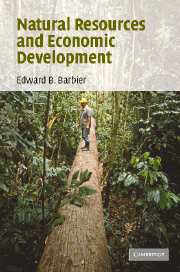Book contents
- Frontmatter
- Contents
- List of figures
- List of tables
- Acknowledgments
- Introduction
- 1 Natural resources and developing countries: an overview
- 2 Natural resource-based economic development in history
- 3 Does natural resource dependence hinder economic development?
- 4 Frontier expansion and economic development
- 5 Explaining land use change in developing countries
- 6 The economics of land conversion
- 7 Does water availability constrain economic development?
- 8 Rural poverty and resource degradation
- 9 Can frontier-based development be successful?
- 10 Policies for sustainable resource-based development in poor economies
- References
- Index
7 - Does water availability constrain economic development?
Published online by Cambridge University Press: 06 July 2010
- Frontmatter
- Contents
- List of figures
- List of tables
- Acknowledgments
- Introduction
- 1 Natural resources and developing countries: an overview
- 2 Natural resource-based economic development in history
- 3 Does natural resource dependence hinder economic development?
- 4 Frontier expansion and economic development
- 5 Explaining land use change in developing countries
- 6 The economics of land conversion
- 7 Does water availability constrain economic development?
- 8 Rural poverty and resource degradation
- 9 Can frontier-based development be successful?
- 10 Policies for sustainable resource-based development in poor economies
- References
- Index
Summary
The previous two chapters of Part Two focused on the economic factors and conditions determining land conversion in developing countries. The following chapter is concerned with the problem of freshwater availability and use, which was highlighted in Chapter 1 as an important “stylized fact” of the role of natural resources in economic development for many low and middle-income economies.
The future availability of freshwater supplies in developing countries is often suggested as a possible major constraint on the development efforts of these economies. That is, even if sufficient land and other natural resources are available for exploitation, the scarcity of water will limit economic development in many low and middle-income economies. The purpose of this chapter is to examine in more detail the role of water supplies and allocation in economic development. The approach taken to water in this chapter parallels that of the previous two chapters on the economics of land use change and conversion.
The chapter begins with a review of current and future sources of water supply and trends in use in developing countries. As suggested by Barro (1990) and Barro and Sala-I-Martin (1992), the actual supply of water utilized by a country, through domestic, agricultural and industrial use, has the characteristics of a government-provided public good subject to congestion. This in turn implies that the influence of water utilization on economic development can be depicted through a growth model that includes this congestible public good as a productive input for private producers.
- Type
- Chapter
- Information
- Natural Resources and Economic Development , pp. 242 - 285Publisher: Cambridge University PressPrint publication year: 2005



